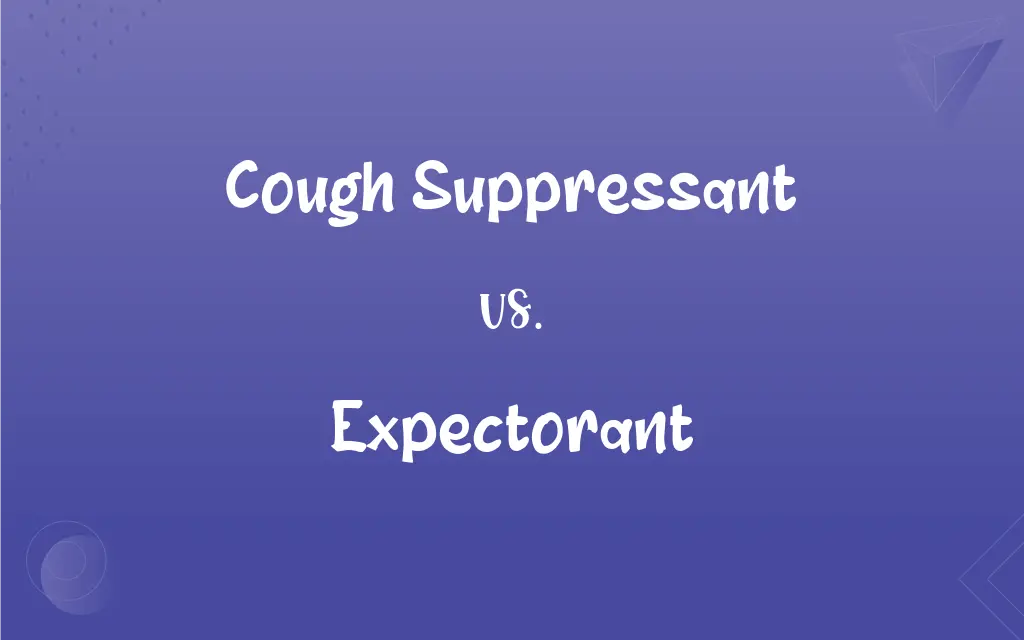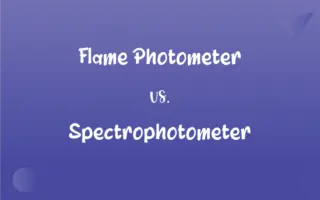Cough Suppressant vs. Expectorant: What's the Difference?
Edited by Janet White || By Harlon Moss || Published on March 31, 2024
A cough suppressant calms coughing, while an expectorant helps clear mucus from the respiratory tract.

Key Differences
A cough suppressant, also known as an antitussive, is used to reduce or suppress the urge to cough, providing relief from a dry, hacking cough. An expectorant, on the other hand, works by thinning and loosening mucus in the airways, facilitating easier clearing of the respiratory tract.
Cough suppressants are ideal for dry, non-productive coughs where there is little to no mucus. Expectorants are used for productive coughs with mucus that needs to be expelled from the respiratory system.
Common active ingredients in cough suppressants include dextromethorphan and codeine. Expectorants typically contain guaifenesin as the active ingredient.
Cough suppressants act on the brain's cough center to suppress the cough reflex. Expectorants increase the volume of secretions in the respiratory tract, making it easier to cough up the mucus.
Suppressants are often used at night to provide relief from persistent coughing that can interfere with sleep. Expectorants are recommended during the day to help clear mucus and improve breathing.
ADVERTISEMENT
Comparison Chart
Function
Reduces or suppresses cough
Thins and loosens mucus
Ideal for Cough Type
Dry, non-productive coughs
Productive coughs with mucus
Common Active Ingredients
Dextromethorphan, codeine
Guaifenesin
Action Mechanism
Acts on the brain's cough center
Increases respiratory tract secretions
Recommended Usage
Often at night for uninterrupted sleep
During the day to clear mucus
ADVERTISEMENT
Cough Suppressant and Expectorant Definitions
Cough Suppressant
An agent that calms the cough reflex.
The doctor prescribed a cough suppressant for his persistent cough.
Expectorant
Medication for enhancing mucus clearance from airways.
He found relief for his congested chest using an expectorant.
Cough Suppressant
A medication that reduces the urge to cough.
She took a cough suppressant to relieve her dry cough.
Expectorant
A medication that helps clear mucus from the respiratory tract.
The expectorant helped him expel the congestion in his chest.
Cough Suppressant
A remedy for suppressing non-productive coughs.
The over-the-counter cough suppressant helped ease her symptoms.
Expectorant
An agent that thins and loosens chest mucus.
She used an expectorant to ease her productive cough.
Cough Suppressant
A drug that reduces cough frequency.
A cough suppressant was necessary to help him sleep.
Expectorant
A drug that promotes the expulsion of phlegm or mucus.
The doctor advised taking an expectorant for his bronchitis.
Cough Suppressant
Medication used to control or eliminate coughing.
The pediatrician recommended a mild cough suppressant for the child.
Expectorant
A remedy that increases bronchial secretion.
An expectorant was prescribed to make her cough more productive.
Expectorant
Promoting or facilitating the secretion or expulsion of phlegm, mucus, or other matter from the respiratory tract.
Expectorant
An expectorant medicine.
Expectorant
(medicine) An agent or drug used to cause or induce the expulsion of phlegm from the lungs.
Expectorant
(medicine) Causing or assisting the expulsion of phlegm.
An expectorant preparation
Expectorant
Tending to facilitate expectoration or to promote discharges of mucus, etc., from the lungs or throat.
Expectorant
A medicine promoting expectoration
FAQs
Is an expectorant useful for a dry cough?
No, expectorants are for productive coughs with mucus.
Are expectorants safe for children?
Some are, but always consult a pediatrician first.
Can I take a cough suppressant and expectorant together?
Yes, some medications combine both; consult a doctor.
Are expectorants effective for bronchitis?
Yes, they can help clear mucus in bronchitis.
Can expectorants help with sinus congestion?
They primarily target chest congestion, not sinus.
Can cough suppressants cause drowsiness?
Some can, especially those containing codeine.
Can I use a cough suppressant for a wet cough?
It's not ideal; suppressants are better for dry coughs.
Are there natural cough suppressants?
Yes, honey and certain herbal remedies can act as natural suppressants.
How fast do expectorants work?
They may start working within a few hours.
Do cough suppressants cure the cough?
No, they only suppress the symptom, not the cause.
How long can I use an expectorant?
Typically for the duration of symptoms, but not for prolonged periods without consulting a doctor.
Can I use a cough suppressant for a cough with phlegm?
It's not recommended, as it can interfere with mucus clearance.
Should I drink water with a cough suppressant?
Yes, staying hydrated is important when taking suppressants.
Is it safe to drive after taking a cough suppressant?
Caution is advised, especially if the suppressant contains sedatives.
Can I take expectorants at night?
Yes, but they may increase coughing initially due to mucus clearance.
Are expectorants safe during pregnancy?
Consult a doctor, as some may not be recommended.
Can expectorants cause side effects?
They can, including gastrointestinal upset or dizziness.
Do cough suppressants interact with other medications?
They can, especially if containing codeine or dextromethorphan.
Can allergies be treated with cough suppressants?
They may relieve symptoms, but won't treat the allergy itself.
Do expectorants treat the underlying cause of a cough?
No, they help manage symptoms but do not treat the cause.
About Author
Written by
Harlon MossHarlon is a seasoned quality moderator and accomplished content writer for Difference Wiki. An alumnus of the prestigious University of California, he earned his degree in Computer Science. Leveraging his academic background, Harlon brings a meticulous and informed perspective to his work, ensuring content accuracy and excellence.
Edited by
Janet WhiteJanet White has been an esteemed writer and blogger for Difference Wiki. Holding a Master's degree in Science and Medical Journalism from the prestigious Boston University, she has consistently demonstrated her expertise and passion for her field. When she's not immersed in her work, Janet relishes her time exercising, delving into a good book, and cherishing moments with friends and family.
































































